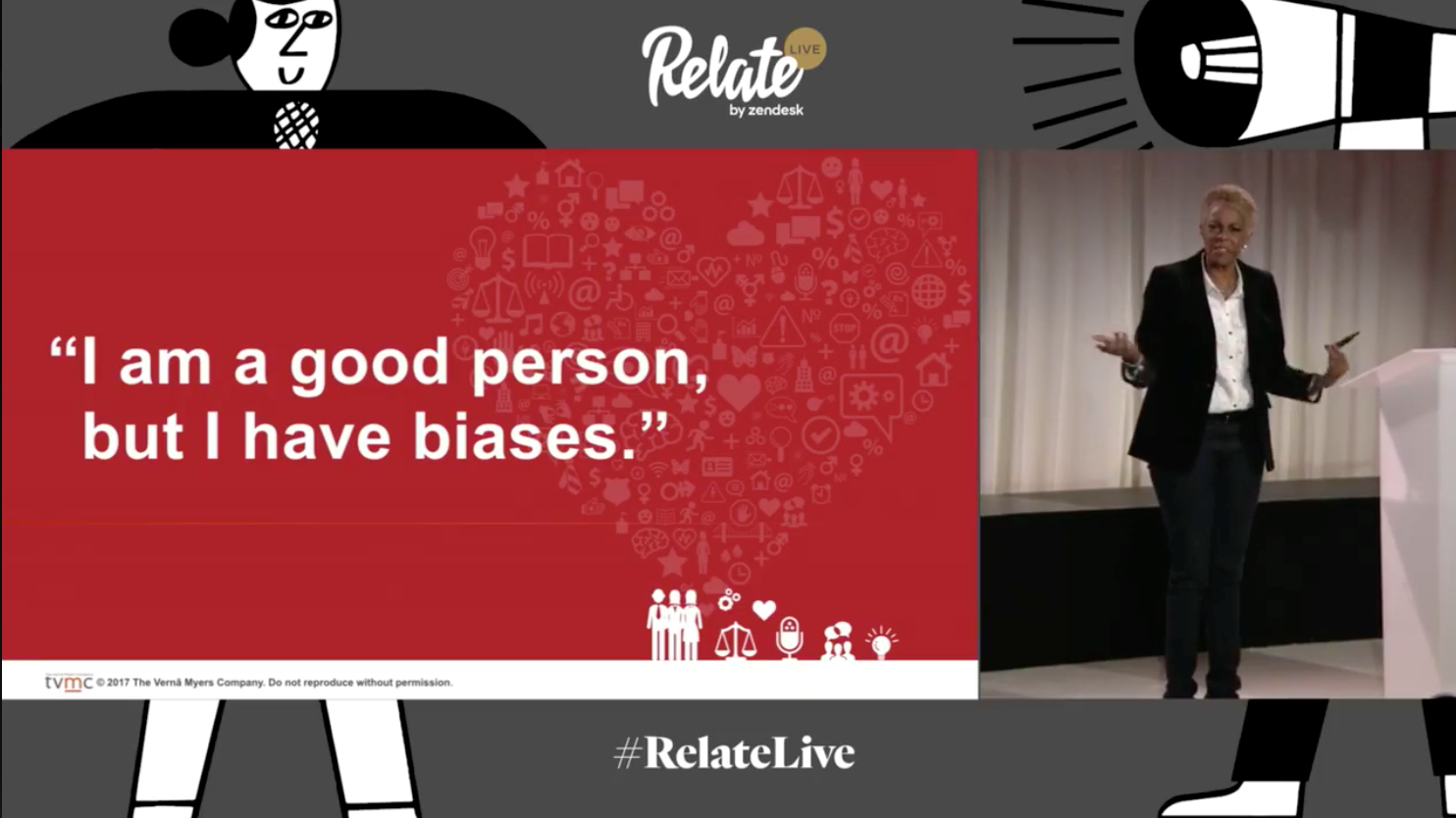A few months ago, I had the honor — and fun! — of speaking at Relate Live by Zendesk, a three-day conference on how people can build better relationships with their customers and each other. (See my post-event video here!)
In my presentation, “What if I say the wrong thing? Interrupting bias in ourselves and others,” I talked about how people can practice culturally effective habits to help build more authentic and inclusive relationships across race, gender, class, culture, age, and ability.
I also offered answers to some of those big, scary questions we all have when we’re working on finding and overcoming our biases: What should I do if I say the wrong thing? Or if someone else does? How do I keep my understanding of different cultures and worldviews moving forward without dying of embarrassment along the way?
Here are my top ten tips:
- Expand
your comfort zone! Understand that your way of seeing the world
is just that—your way. Hang out with people who will be honest with you
and share their different views of the world without blame or shame. Use
that exposure to push out your world’s boundaries and eliminate the blind
spots.
- If
you don’t want to say the wrong thing, pause before you speak. It
seems so obvious! Yet it’s crucial. There have been plenty of times when I
was extremely glad I’d held my tongue until my revealing
and embarrassing assumptions about a person were challenged.
- Be
kind to yourself when you discover blind spots. It takes time to
understand the ways you’ve been shaped by biases over the course of your
lifetime. You couldn’t see all of the possible perspectives even if you
tried. No one can.
- Get
accustomed to making mistakes. It’s inevitable once you operate
outside your comfort zone. It’s a good sign, actually. The most important
thing is adopting the attitude that cultural competence is an important
skill to have and you will do what it takes, including risking
embarrassment, to keep moving forward.
- Welcome
correction as an opportunity for learning. Change is hard even
when you are committed to that change—and changing one’s language can be
especially difficult. But the experience can be invaluable, even as it
makes you more aware of your shortcomings.
- Engage,
rather than disengage. You might be tempted to withdraw from a
relationship after putting your foot in your mouth. But try to see it as
an opportunity to deepen the relationship, rather than a reason to abandon
it.
- Learn
to apologize. Sometimes when we move out of our intimate circle,
our instinct is to defend ourselves (“that’s not what I meant!”) rather
than to apologize. But intent is not the same as impact. An apology should
look and feel like an apology. Give it the attention it deserves, and
remember that apologizing is not a sign of weakness. People know that no
one is perfect; what they don’t like is when we pretend to be.
- Be
an Upstander. If you overhear someone revealing bias, find the
courage to say something. Use a tone that’s welcoming and nonjudgmental,
and use an “I” statement, such as “I have a hard time hearing…” or “I’m
feeling pain for the so-and-so people…” You might choose
a question, such as “Why do you say that?” or offer a different point of
view, like “Actually, my experience has been…” Practicing this skill in a
safe environment, with family and good friends, can help you build your
confidence.
- Engage
in training opportunities. Take advantage diversity training
opportunities wherever you can find them: at your children’s school, your
place of worship, your job, etc. Approach any training or workshop with a
no-shame-no-blame-or-attack approach. Blaming or shaming ourselves or others
does not advance the conversation or learning. Ask questions; it’s your
opportunity to say the wrong thing in a safe environment.
- Be
patient with yourself and others. Worldviews are stubborn. It takes
time for entire shifts to happen, and sometimes revelations are fleeting.
With patience, commitment, humility and willingness to learn, we can keep
moving diversity and inclusion forward.
People are always saying to me, “Vernā is it ever going to get better? Are we ever going to experience true diversity?” And my feeling is, because I’m outrageously optimistic, I do!
You can find more insights on becoming more culturally effective in my book: What if I say the Wrong Thing? 25 Habits for Culturally Effective People.
“Diversity is being invited to the party; Inclusion is being asked to dance.”™ – Vernā Myers


